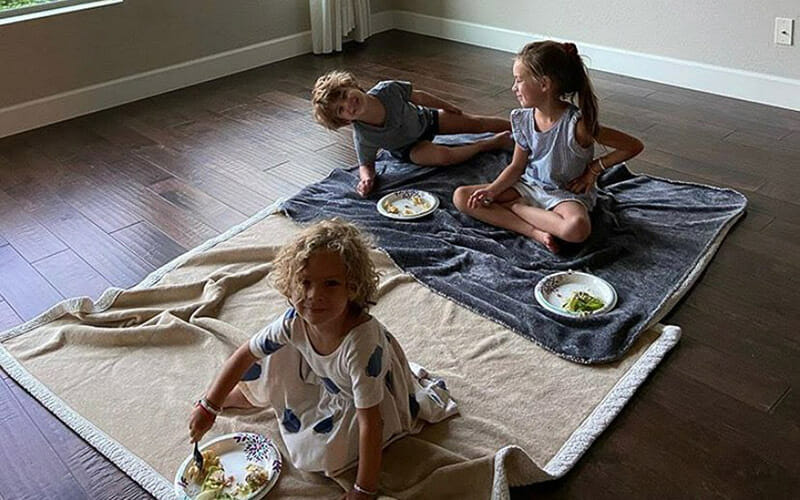Nadia and Ernest Saco of Gilbert already had been searching for a new home before the pandemic hit in 2020, but when schools and offices closed across Arizona, their quest became more urgent.
“I was working from home all of a sudden,” said Ernest Saco, a senior product manager for a software company and a father of three. “And we have all five of us just on top of each other in this 1,500-square-foot house. I’m working out of our bedroom. And our kids are home because school’s out, but they’re also home because all the places they would normally go to for fun are closed.”
“We were pretty desperate to get out,” Nadia Saco added.
READ ALSO: Are short-term rentals investors ruining Arizona housing market?
But as the Sacos’ search intensified, they found themselves competing for a shrinking pool of available homes. From April to July 2020, active listings in metro Phoenix declined by 42%, according to data from Realtor.com. So to stand out among the bidders, the Sacos turned to a tactic that’s become increasingly common – and increasingly scrutinized – in the homebuying process: the love letter.
In a letter delivered to the seller of the home they closed on in August 2020, Nadia Saco introduced their family, mentioned what her husband did for a living and detailed the “dreams” they had for the home.
“I could picture the Christmas tree, where it would go and my kids coming down the stairs Christmas morning,” she said. “I love to cook and so I pictured myself making these family dinners. And I just really visualized ourselves in this home and kind of tried to express those feelings.”
A photo of the Saco family accompanied the letter.
“Buyer love letters are a tactic used by some buyers in an attempt to stand out to a seller, especially in hot markets with low inventory and bidding wars,” the National Association of Realtors said on its website in October. “Seemingly harmless, these letters actually raise fair housing concerns, and could open real estate professionals and their clients to fair housing violations.”
“They often contain personal information and reveal characteristics of the buyer, such as race, religion, or familial status, which could then be used, knowingly or through unconscious bias, as an unlawful basis for a seller’s decision to accept or reject an offer.”
The federal Fair Housing Act prohibits discrimination against both homebuyers and renters based on race, color, national origin, religion, sex, familial status or disability.
Even seemingly innocuous details can risk running afoul of fair housing standards.
Describing children coming down the stairs on Christmas morning, for instance, “not only reveals the potential buyer’s familial status, but also their religion, both of which are protected characteristics,” the Realtors association said.
To avert the potential for infractions, Oregon passed a law in June requiring sellers’ agents to “reject any communication other than customary documents in a real estate transaction, including photographs, provided by a buyer.” It’s the first state in the country to enact such legislation.
Jay Young, executive director of the Southwest Fair Housing Council, said he doesn’t expect Arizona to follow suit anytime soon.
“I think a law like that would not have a lot of chance of success in Arizona,” Young said. “I don’t think the political climate is such that the state Legislature would move to outlaw the practice.”
However, the Fair Housing Act applies across the country. Young said sellers who violate that law by choosing a buyer based on “protected characteristics” risk facing a lawsuit.
A complaint also could be filed with the federal government against the violator, which could result in monetary damages, he said.
But so far, claims of discrimination in Arizona based on buyer love letters appear to be rare, if they happen at all.
“I have personally not heard of any claims or lawsuits arising out of a buyer’s love letter to a seller,” said Michelle Lind, CEO of the Arizona Association of Realtors.
And the extent to which these letters actually result in discrimination is unclear.
“I think it’s one of those things that is really hard to prove,” Young said. “But what we do know is that racism and discrimination has been part of our housing market really forever, and there’s still ample evidence that it’s happening today.”
For instance, a three-year investigation by Newsday published in late 2019 found widespread evidence of discriminatory practices among Long Island, New York, real estate agents.
Although the Sacos acknowledge the potential problems of letters like theirs, Ernest, who works part time as a Realtor, suggested love letters may stave off investors, who have been “snatching up” homes across the Valley.
According to a recent report from Realtor.com, the Phoenix metro area is the No. 1 market in the country where housing inventory is negatively impacted by investors.
“I prefer to sell to someone who’s not an investor, regardless of if their offer is the best offer,” Ernest Saco said.
Lind said investors are not protected against discrimination by the Fair Housing Act.
“Certainly a love letter could indicate to a seller whether their buyer is an investor or if their buyer is someone that’s going to use the home as a primary residence,” she said. “If that’s important to the seller, that could be a factor.”
Although selling a home is an “emotional transaction, sellers are generally most motivated … by price and terms,” she said.
But in the Sacos’ case, both price and emotion seemed to play a role in the seller’s decision to select their offer over five others. After the Sacos sent the letter, they still had to raise their offer. But the letter may have opened the door to making that higher offer, Ernest said.
“I don’t know with 100% certainty, but I think they gave us more of a chance to come in higher because of the letter,” he said. “In a weird way, maybe they were rooting for us to get the home now that they understood our character and how we fit into the community.”
The strong sense of community in their new neighborhood was part of the home’s appeal to the Sacos. They also believe the sellers felt a responsibility to help maintain that community feel even after they left.
“Everyone on our street has grown really close,” Nadia Saco said. “And so I think they take it very seriously when a new family moves in that it’ll be a good fit for the street.”
Including a love letter doesn’t always ensure a successful bid, however. The Sacos put offers on two other houses before finally landing their new home, and one of those offers also included a letter, they said. And it hasn’t always worked for Ernest Saco’s clients, either.
Still, he encourages homebuyers to do whatever it takes to land the home of their dreams.
“Typically, my clients will ask me if they should write a letter,” he said. “My advice to them is usually, anything you can do to attempt to make your offer seem more valuable, I’d advise doing that. Especially if it’s a bidding war.”
When he represents sellers, though, he strikes a somewhat different tune.
“My advice to my sellers is always take the emotion out of it and keep it strictly financial,” he said. “Whatever seems to be the strongest offer with the least amount of risk is what’s in your best interest, and move forward with that.”
But sometimes that emotion still comes into play for his sellers.
One of Ernest Saco’s recent clients chose an offer that was “on par with the other top offers,” but also included a letter that described the buyer’s “life journey.” As the seller had a similar “life journey” of his own, he gave the buyer a chance to raise his offer, Ernest Saco said.
“It did help that person in that situation,” he said.
And he thinks that, ultimately, homebuyers should be able to express their hopes and share their stories with sellers.
“Our home is more than just wood and stucco. It’s where we’re raising our family. It’s where we’re spending the majority of our time,” Ernest Saco said.
“Having a way to show someone that your home will be in good hands, the home that you spent living your life in, I think is a positive thing – if biases can be removed and discrimination can be removed,” he said.
NOTE: If you believe you have been a victim of housing discrimination, either as a buyer or renter, contact the Civil Rights Division of the Arizona Attorney General’s Office at 602-542-5263, or by email at CivilRightsInfo@azag.gov. The Southwest Fair Housing Council also offers services to assist possible victims. Its website is swfhc.com.
Story by Rob Winder, Cronkite News




